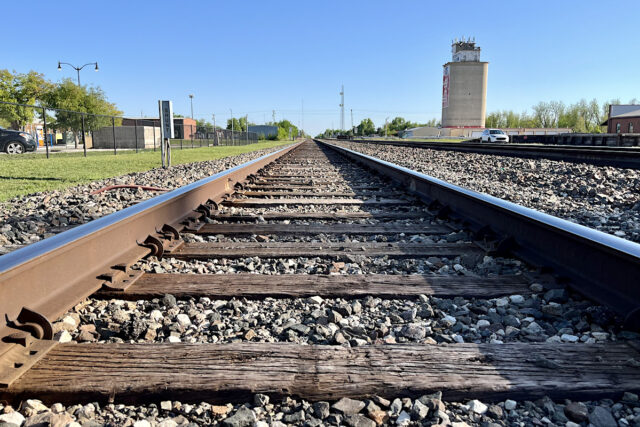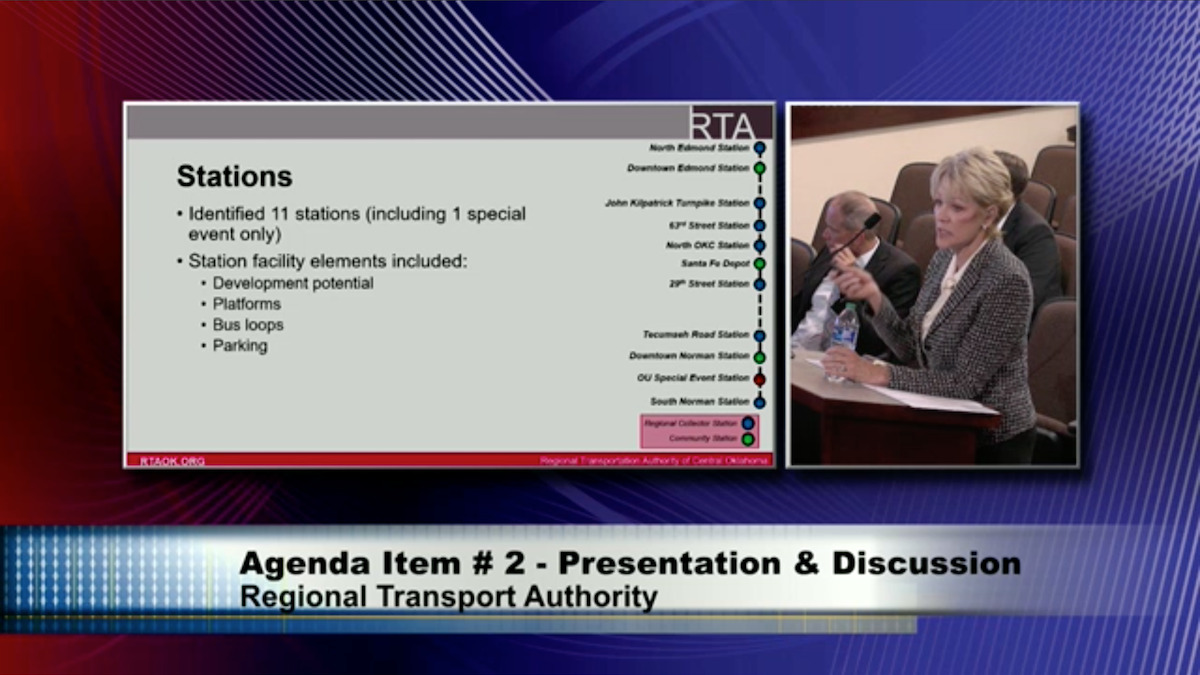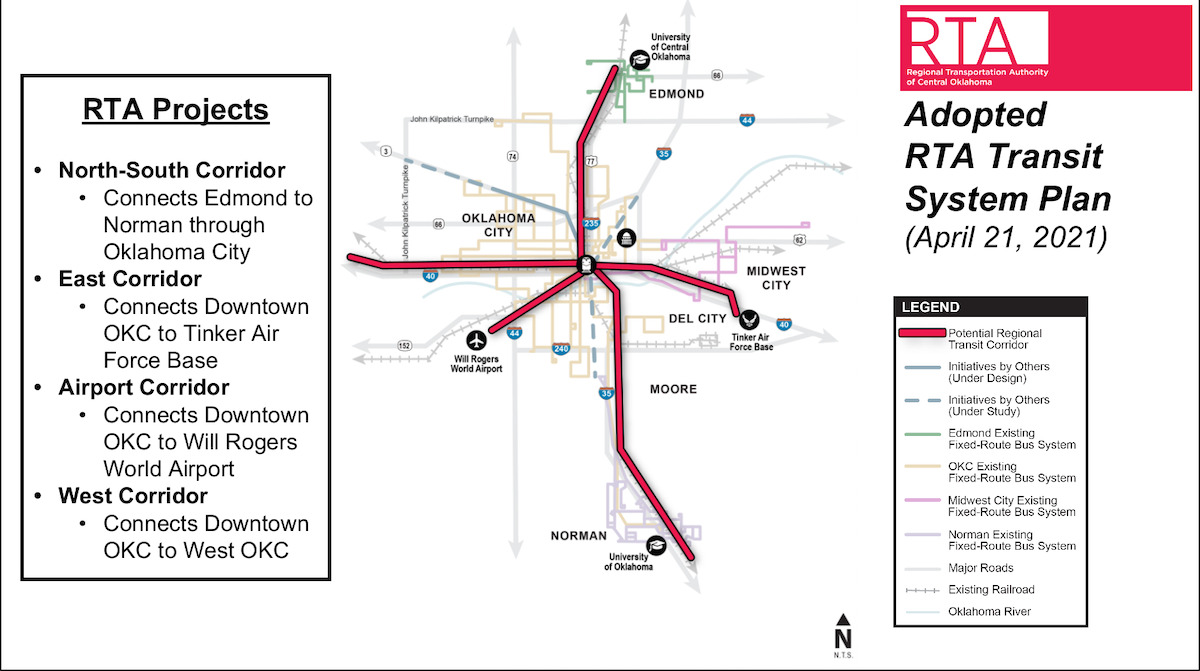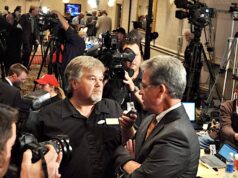

The Regional Transportation Authority of Central Oklahoma would like to bring a ballot referendum before Oklahoma City, Edmond and Norman voters in either fall 2024 or spring 2025 to fund its proposed rail commuter project, RTA representatives told the Edmond City Council on April 24.
Jason Ferbrache, the interim executive director of RTA, said Burlington Northern Santa Fe has shown a willingness to share its right of way for the project, which would travel through each of the member cities along the north-south corridor. The project, which faces unanswered questions about its total cost to RTA member cities, will ultimately need an access agreement with BNSF to be completed.
The proposed project also includes alternative corridors that would take passengers to Tinker Air Force Base — the largest employer in the three cities — and Will Rogers World Airport.
However, because RTA still needs more right of way and more railway track to complete the project, Ferbrache said RTA hopes to call for a special election among all three member cities — Edmond, OKC and Norman — to propose dedicating a percentage of sales tax proceeds from each city to fund the rail commuter project.
“I know that’s an additional discussion, but that’s really one of the major roles that member cities will decide is that advice and guidance — when does (an election) seem to work best collectively for the region?” Ferbrache said.
Kathyrn Holmes, another RTA executive, said BNSF is currently undertaking modeling to marry RTA’s operating plan and their own proposed growth plan. After that completed plan is given to RTA — which is expected to happen in June — the organization will then be asked to complete a conceptual design “that will advance the engineering work and the capacity improvements,” Holmes said.

Holmes said the conceptual design will get RTA “real numbers” that can be taken to voters on a ballot referendum. She said the conceptual design is estimated to be complete in June 2024.
“We will have our financial plan developed that would demonstrate what we need, not only for the infrastructure improvements, the bonding capacity, the debt service on the bonds, but also the ongoing operations and maintenance costs, so that we can roll all that up and say to the voters, ‘We need x percent of a sales tax increase to support this line.'”
State law limits RTA’s options, in that it can only levy a sales tax within member cities at a maximum rate of 2 percent. No other tax revenue sources from member cities can be used to fund the project, which will largely be backed by federal grants.
Additionally, RTA is asking for member cities to procure property to be used for train stations, which would be constructed by RTA. Currently, two stations are planned for Edmond, five are planned for OKC and four are planned for Norman — including a special events station to be used for large OU events.
Some general areas have been recommended for stations, but specific properties have not been selected. In all, 11 proposed stations were presented at the Edmond City Council meeting:
- Edmond
- North Edmond Station
- Downtown Edmond Station
- Oklahoma City
- John Kilpatrick Turnpike Station
- 63rd Street Station
- North OKC Station
- Santa Fe Depot
- 29th Street Station
- Norman
- Tecumseh Road Station
- Downtown Norman Station
- OU Special Event Station
- South Norman Station
Originally, RTA included three additional cities — Midwest City, Del City and Moore — in its proposal. However, Midwest City withdrew from RTA in December 2021, while Del City and Moore withdrew in June 2022. City leaders cited financial impact as their reason for withdrawing.
‘It would be incredible’

Former Edmond Ward 2 Councilman Josh Moore, who did not run for reelection this year, said the RTA commuter rail project would help alleviate Edmond’s workforce housing issue by providing another option for employees to commute to Edmond.
“We talk about our housing challenges, our cost of housing and workforce, and, my goodness, the things that it could do for business in Edmond and especially in downtown,” Moore said. “It would be incredible.”
Former Edmond Ward 1 Councilman David Chapman, who also chose not to pursue a reelection bid, said constructing a rail line to the Will Rogers World Airport would be “huge.”
“It’s amazing to me how many cars there are in parking at Will Rogers airport. It’s crazy,” Chapman said. “Until you consider there is no other way to get there.”
Oklahoma City Mayor David Holt told NonDoc that OKC will be working closely with the RTA on funding proposals.
“State law allows for cities to join together to form an RTA, and then that RTA can seek funding through a sales tax vote,” Holt said. “This effort is critical for our region’s future growth, and it has been over a decade in the making. I have always considered it one of the most important initiatives that will occur during my time as mayor, and that’s why I asked Gov. (Brad) Henry to lead the charge (as RTA chairman). RTA is truly an independent level of government, and though any funding proposal will be theirs, city and community leaders are and will be working closely with RTA leadership to see this through.”
Holt said the trajectory of OKC’s growth means those options will become more of a priority in the months and years to come.
“There won’t be anything concrete to consider this calendar year, but I think we are getting closer to a time when this will be a front-burner discussion,” he said. “We are already America’s 20th-largest city, and our metro’s growth in the decades to come will demand more public transit options, including light rail. That will be a vital conversation in the years to come.”
Norman Ward 7 Councilman Stephen Tyler Holman said he and many of his colleagues are supportive of the commuter rail project, but he said concerns exist about the amount of sales tax funds that RTA will demand from voters.
“The sales tax part of it is what has given us the most heartburn, and it has for me for the entire time that I’ve been involved in this project,” Holman said.
Holman, who chairs Norman’s Community Planning and Transportation Committee, said part of the reason Moore dropped out of RTA was owing to worries that Moore residents would vote down a sales tax increase to fund the commuter rail project.
However, Holman said Norman residents may be more “friendly” to that idea, as they previously passed a one-eighth cent sales tax in 2019 to fund the city’s existing public transportation system when the University of Oklahoma scaled back its support. The one-eighth cent sales tax replaced a portion of a one-fourth cent sales tax which expired earlier that year.
Owing to the current public transportation tax, Norman likely could avoid having to increase the tax as much as Edmond or OKC to fund the commuter rail, Holman said. Norman’s current sales tax was designed to exist until funding for metropolitan-wide transit was identified and approved.
“We wouldn’t need to increase it by as much in Norman because we already have a dedicated sales tax for it,” Holman said. “So we may need to increase that percent that we’re getting, but we wouldn’t be creating a brand new tax necessarily in Norman, and we wouldn’t have to increase it maybe as much as they may have to in OKC or Edmond.”
Holmes said a construction schedule would be determined if voters approve the three cities’ ballot referenda. A finalized access agreement with BNSF and finalized grant funding agreements would also be needed.
“Just as an example, the commuter rail line north in Salt Lake City, which is approximately the same mileage as this line from Edmond to Norman, was constructed in six years. Could be more, could be less, but that’s my thinking,” Holmes said. “Now in Salt Lake City, we built a line on an entirely separate corridor. Here, we’re going to be sharing BNSF infrastructure, so it could be faster than that, but that’s the anticipation we have as we’re planning.”
(Correction: This article was updated at 12:59 p.m. Tuesday, May 2, 2023, to clarify that the one-eighth cent sales tax passed by Norman residents in 2019 was not an increase, as it repurposed a portion of an existing one-fourth cent sales tax which expired the following year. NonDoc regrets this error.)




















